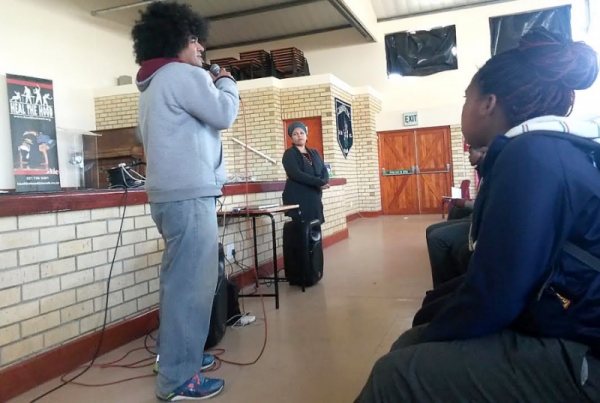Where does the word “gogga” come from?

The hall at Lavender Hill high school erupted in giggling and whispers on Monday as students watched the documentary “Afrikaaps” on the story of the Afrikaans language and the origin of words like “Yoh!” and “gogga.”
The documentary, screened by hip hop artist Emile Jansen, aka Emile YX, aims to tell the “untold history” of the language and create “a sense of pride” among young people on the Cape Flats.
Screenings will take place at a dozen schools across Cape Town in the next two weeks as part of the run-up to the first ever Cape Flats film festival, expected to take place at the end of August.
“The roots of Afrikaans can be traced back to Cape Town, where it started as a pidgin language. … Everyone should know where they come from. We want these kids to be proud of their heritage,” Jansen said.
“Afrikaaps”, directed by Dylan Valley and co-produced by Plexus Films and The Glasshouse/Catherine Henegan, traces the language from its origins with the indigenous people, the slaves and the first settlers in the Cape in the 1600s into the 21st century.
The film is based on a musical performed at the Artscape Theatre in May last year after it first premiered on stage in 2010. The musical incorporates a “fusion of traditional musical genres” including hip hop, ghoema and contemporary jazz.
The film includes interviews with the main performers and with history and language experts like heritage activists Patrick Tariq Mellet and Dr Neville Alexander.
The small cast includes Khoisan activist and storyteller Jethro Louw, local rapper Jitsvinger and singer Janine van Rooy, aka Blaq Pearl, among others. It won “Best Film” at the Babel Film Festival in Sardinia in Italy in 2011 and Best New South African Documentary at the Cape Winelands Film Festival Awards later that year.
“Words like ‘Eina!’, ‘Aitsa!’ and ‘gogga’ are from the Bushman and other words like ‘pierang’ and ‘piesang’ come from the Indonesian archipelago. Words like ‘Er!’ and ‘He Er!’ that we thought were just sounds, are actually words for ‘yes’ and ‘no’ for the Nama,” Jansen said.
He said Afrikaaps was the dialect predominantly spoken by coloured people on the Cape Flats rather than the “suiwer Afrikaans” found in a dictionary.
“We are constantly being told that the way we speak to each other is not the right way. We are hoping this documentary will change the way people think. The idea is for young people to have a sense of pride and self-worth,” he said.
Blaq Pearl encouraged the students to learn more about their heritage from the elderly in their communities.
“History isn’t just found in the books, it’s listening to stories from your grandparents and other older people who know things about your history that aren’t necessarily in a book,” she said.
After the screening, Jansen briefly told the students about the upcoming film festival.
“Many of the guys who make documentaries about the Cape Flats are complaining that they can’t sell the positive stories locally and abroad. The industry tends to select stories that are more about gangsterism and drugs. Stories that will have that shock value. This is the only way the world sees coloured people,” he said.
Jansen said during the film festival a collective of local filmmakers and artists would visit different communities, starting in Ocean View on 16 August.
“All the guys who have put together their own documentaries will be showing their work to the communities. Residents will select which one will be played on the day. We will also have someone come in to teach people how to tell their own stories just by using their cellphones,” he said.
Jansen challenged the students to record short videos of their lives so as to change the public’s perception about their community.
“When you type ‘Cape Flats’ into google, all you read about is gangsterism and drugs. We want to show people that not everyone who lives in areas like Lavender Hill are gangsters. Record a short clip of who you are and where you live to show people that you are not a gangster. We will be collecting these videos and uploading the best on Youtube for everyone to see,” he said.
Support independent journalism
Donate using Payfast

Don't miss out on the latest news
We respect your privacy, and promise we won't spam you.
Next: Outdoor sparring

This article is licensed under a Creative Commons Attribution-NoDerivatives 4.0 International License.
